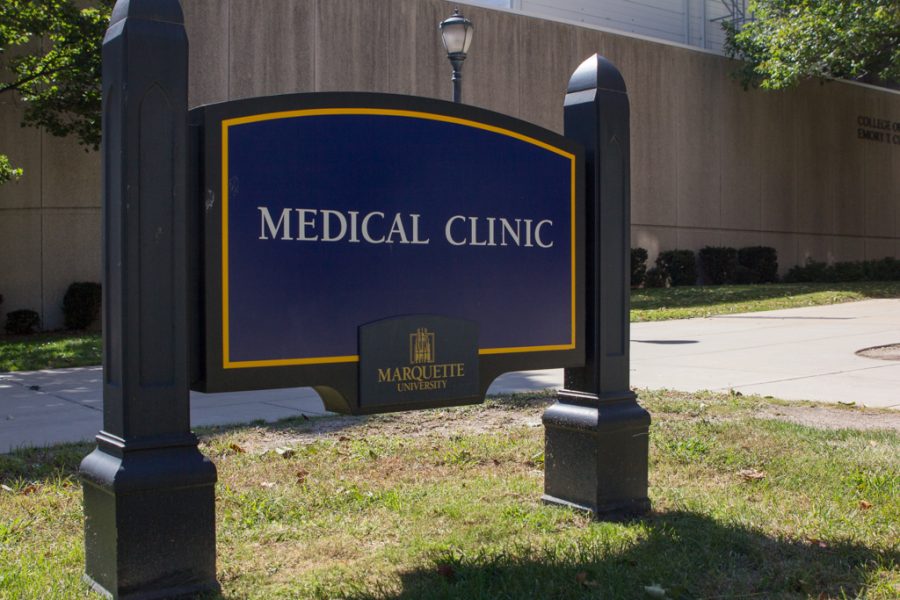Have you ever built a mechanical arm? Taken someone’s blood pressure? Created an ad campaign and pitched it to real ad execs? Marquette seniors are doing these

things everyday as part of different senior experience requirements.
Such experiences are offered in most colleges, allowing students to incorporate knowledge or skills acquired from major courses, but the expectations and final results of these courses vary dramatically.
Pre-professional programs
Students in many pre-professional programs also take courses or programs that apply knowledge from prior classes to work situations in their field.
“For each specialty, we offer clinical practice courses, simulated learning labs, and a synthesis or capstone-like course their senior year,” said Kerry Kosmoski-Goepfert, associate dean of undergraduate programs in the College of Nursing. “We have a solid reputation for preparing clinical nurses who have excellent reasoning abilities and a holistic approach on how to care for patients, which I think makes our students different.”
Michelle Schuh, assistant dean in the College of Health Sciences, said in an e-mail that while the college does not have senior seminars or projects, students in clinical laboratory science, exercise science, athletic training and speech pathology and audiology do clinical experiences, which vary from major to major, and incorporate applied skills specific to each program.
“(Education) students participate in student teaching their second semester senior year, which is required for licensure in the State of Wisconsin,” said Joan Whipp, the educational policy and leadership director of teacher education in the College of Education. “The student teaching is the last of many field components, where they spend lots of time getting practical, hands-on experience and academic work.”
College of Arts & Sciences
In the College of Arts & Sciences, “Senior Experience” courses provide students with a general overview of their major field(s), though the college establishes few clear requirements for standard teaching or curricular expectations, and the courses vary significantly between departments and majors.
Belén Castañeda, associate dean of the College of Arts & Sciences, said in an e-mail all seniors completing a B.A. are required to have a Senior Experience course. They are broadly defined as an opportunity to contemplate the significance of a college education.
In contrast, Castañeda said capstone courses are major-specific. The choice to offer these courses is left up to individual departments, but they can count as Senior Experience courses, though the requirement for graduating seniors to take a Senior Experience course will be discontinued in the 2011-’12 school year.
Dana Dumbacher, a senior in the College of Arts & Sciences, said she took advantage of the newly offered women and gender studies capstone, as it has a defined purpose, which she thought some Senior Experience courses lack.
“In our service learning, we get to learn so much about gender issues in the community specific to our own interests – like my work with (the organization) 9to5 concerning working women,” Dumbacher said. “We get to apply our individual research to the real world. It seems more like grad school work.”
College of Engineering
Students in the College of Engineering are required to complete a senior design project by the college’s accrediting agency in order to graduate, incorporating what students have learned from theory courses while designing projects in the work force.
“All engineers – except civil – are in one course together to complete their senior design projects, which are either proposed by the students or chosen from a list of ideas we compile for the students,” said George Corliss, a professor in the College of Engineering and faculty coordinator for senior design projects. “We create multidisciplinary teams that work on different projects for clients, using real money budgets, time frames and paperwork.”
The College of Engineering also works with a variety of clients on students’ required senior design projects, ranging from individuals to manufacturing companies.
Stephen Burke, a senior biomedical engineering major, is part of an interdisciplinary team working with Owen, a 10-year-old boy with Arthrogryposis Multiplex Congenita, to develop a reaching device he can use easily.
“I really liked this option because I get to work with a real person who can tell us his needs, likes and dislikes, and not just a company making a general prototype,” Burke said. “(The faculty) try to simulate real work in engineering as much as possible.”
Lisa Kilgas, a senior mechanical engineering major, is working for a corporate client to develop a wheelchair that rides over curbs. She is responsible for budgeting, building a prototype, filling out paperwork and presenting to the client.
“This project is really an accumulation of everything we’ve ever learned, from our intro courses until now,” Kilgas said. “Our team adviser and course instructor are there to help, but it’s a lot of our own guess-and-check.”
College of Business Administration
Joseph Terrian, assistant dean of undergraduate programs in the College of Business Administration, said the college doesn’t have an overarching capstone requirement, but some departments offer capstone courses and many students have internships.
Other capstone courses – such as the real estate capstone – focus on case studies instead of individual clients. Mark Eppli, a professor of finance in the college, said he structures this course around Harvard-developed and local real estate cases dealing with several areas of real estate, ranging from retail to residential.
Some departments in the college offer capstone-like courses with specific clients for students, which are often nonprofit organizations or clients that are unable to afford professional resources.
Kate Kaiser, an associate professor of management in the College of Business Administration, teaches a capstone for information technology majors, which allows students to work in teams for a client (such as Milwaukee organization Safe & Sound) to develop a system based on the client’s IT needs.
“The course has lectures and involves working on projects for the client, so it’s somewhat similar to what we’ll be doing in the real world,” said MaryKate McCarthy, a senior in the College of Business Administration and a student in Kaiser’s IT capstone. “We get to work with Safe & Sound to help them track activities, develop prototypes and present them in our groups, which is helpful, but could be more hands-on.”
John Davis, a professor of economics in the College of Business Administration, uses alternative methods to introduce students to a new economic system and expand their perspectives.
“It’s a departure from the standard curriculum, but allows students to reflect on and talk about their coursework,” Davis said. “I personally decided to set up the course with both a term paper and self-taught components, allowing students to present complexity theory economics and research an example.”
College of Communication
Other departments, such as those in the College of Communication, offer capstone projects, where students work on all-encompassing projects or with clients.
“Right now, we have a commitment across all majors to offer some sort of capstone experience,” said Joyce Wolburg, associate dean in the College of Communication. “It’s precisely the point to go beyond what students learn in the classroom and prepare them for what they want to do after graduation.”
Dave Hanneken, an adjunct professor in the College of Communication, offers an advertising capstone where students can work with the Milwaukee Humane Society to create new advertising campaigns. Hanneken is the senior vice president and creative director at Laughlin Constable, an integrated advertising agency with local offices.
“The class is broken up into nine mini ‘agencies’ competing against the others to present their campaigns to the Humane Society in which each student has certain roles,” Hanneken said. “They have an advantage because they get more real-time experience and up-to-date knowledge based on the world in which I work every day.”
Other classes work with clients closer to home. Sarah Hofman, a senior in the College of Communication, worked with the Marquette Athletic Department and affiliates on an anti-binge drinking campaign for her public relations capstone this past fall.
“It was really cool to be able to work on a campaign that had an opportunity to be used once we were finished, which I think is an experience not many undergraduate students have,” Hofman said. “We had a lot of independence in developing our campaigns from start to finish, which was a big difference from other classes, but helps build a portfolio with real work.”
Across all colleges, the administration and faculty stressed a desire to provide students with experiences that would benefit them after graduation, outside general theory courses.
“We really want to make our students ready to work for the best employers and not just be money-making machines, but really part of a profitable entity,” Eppli said. “We want them to be extraordinary individuals, using their education to realize they did get something out of their Marquette experience.”



